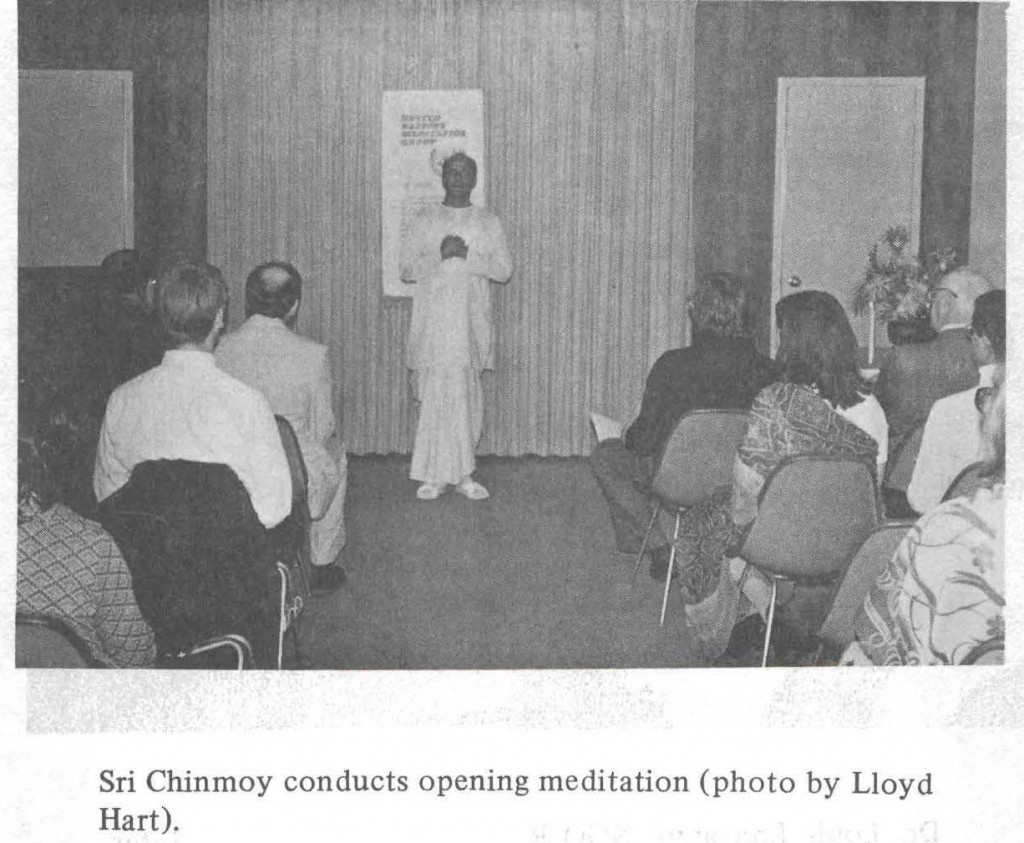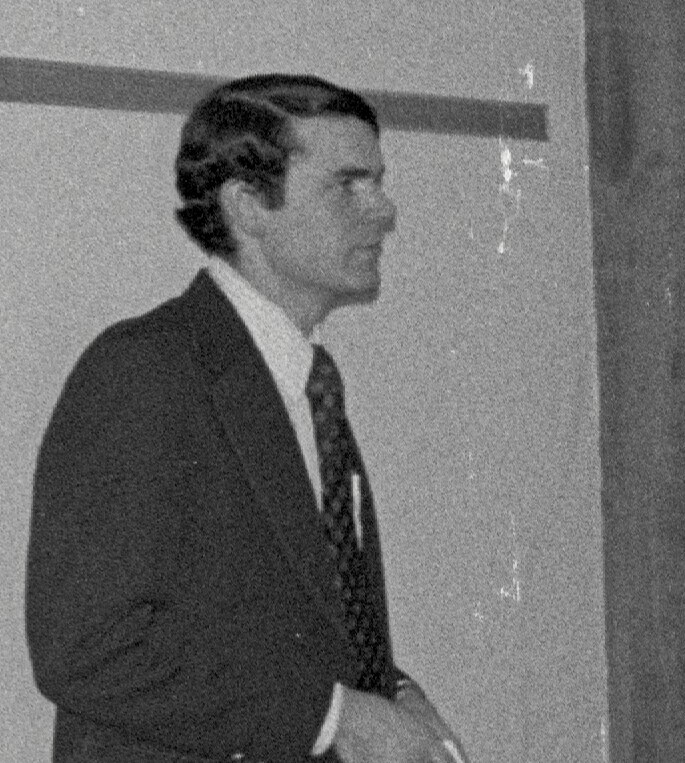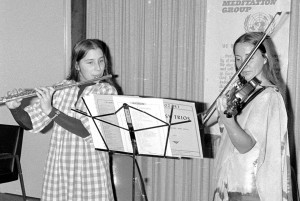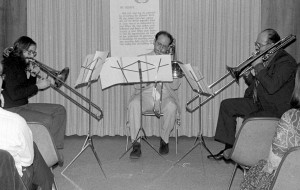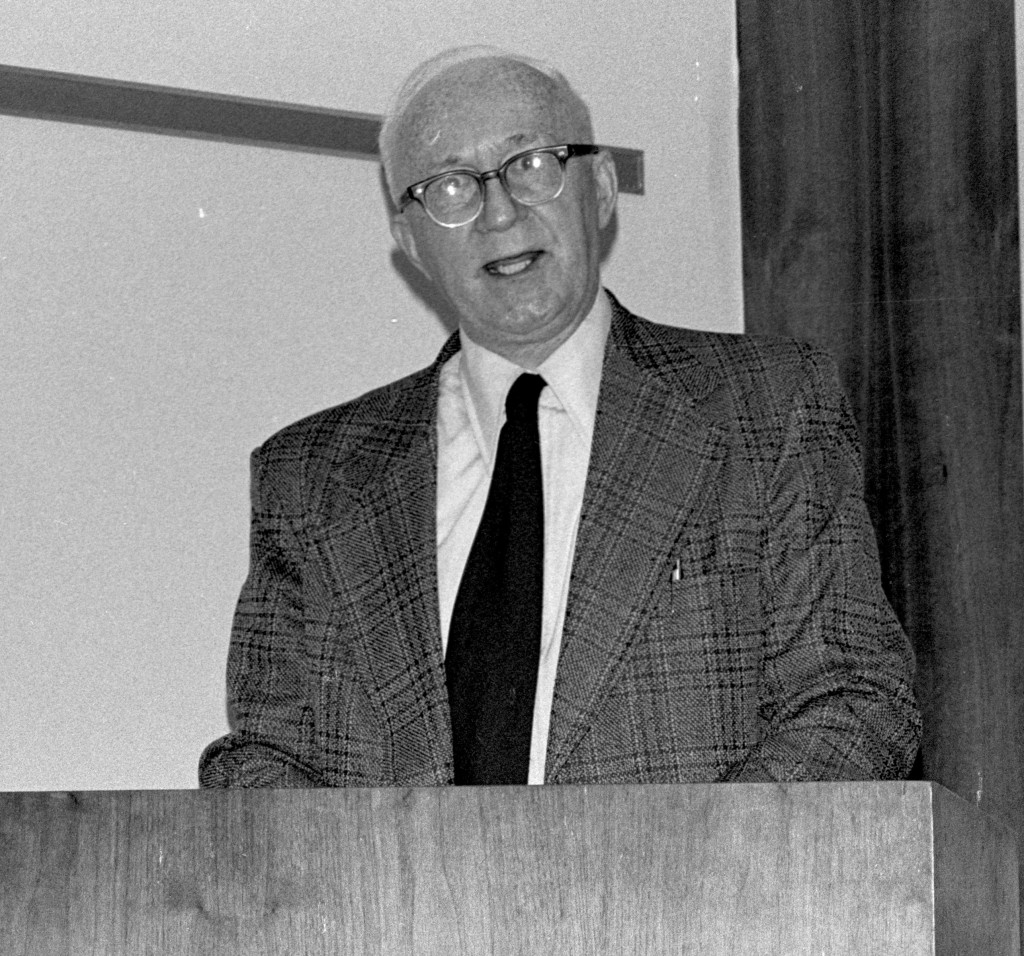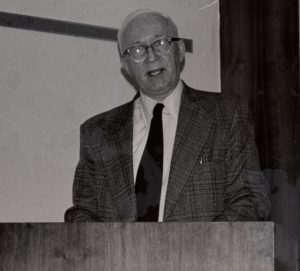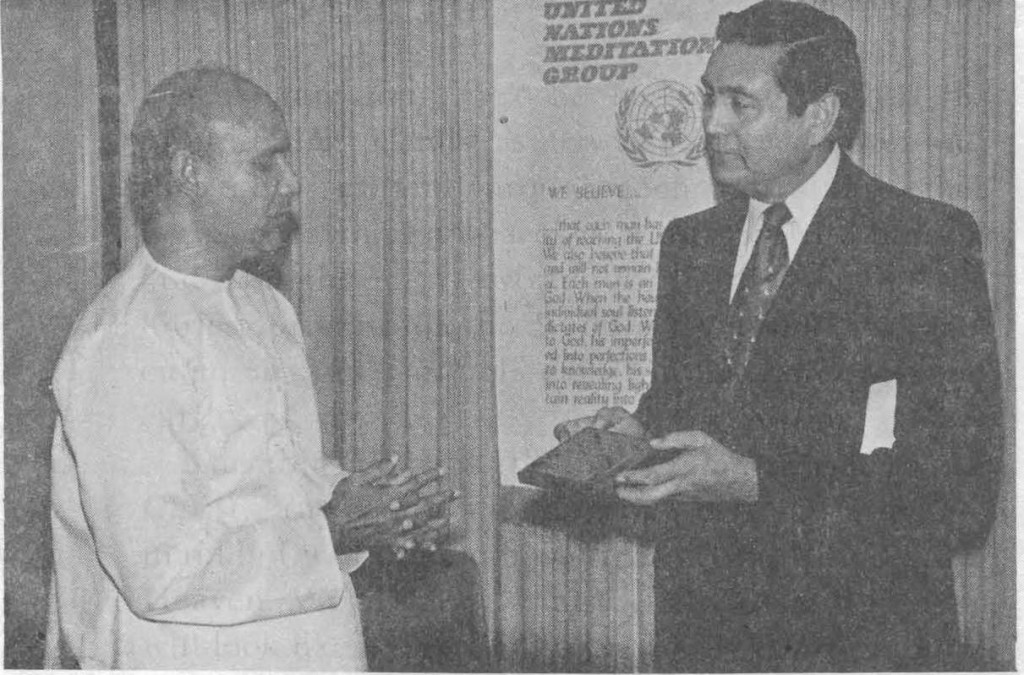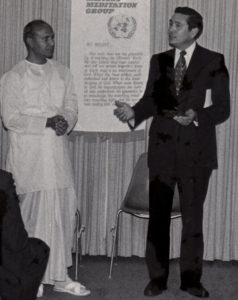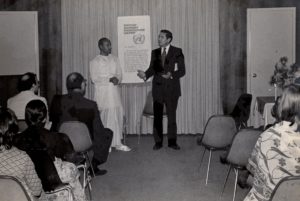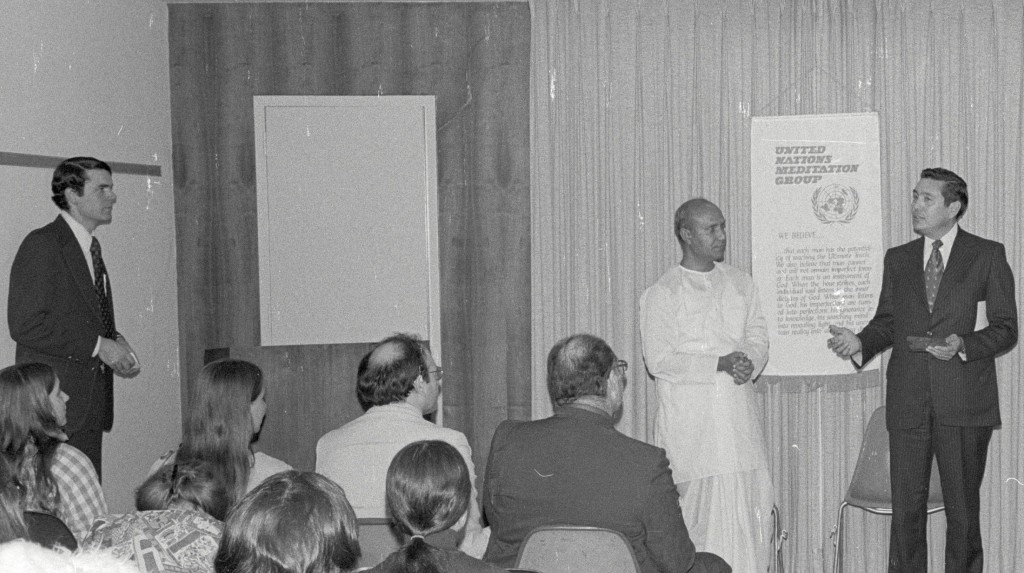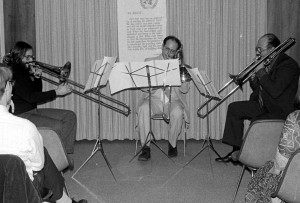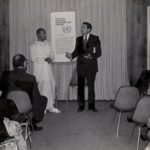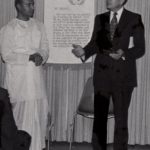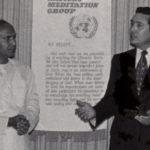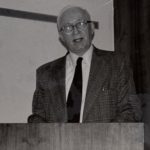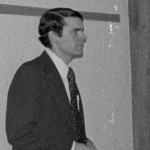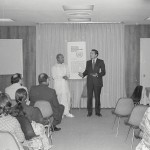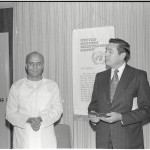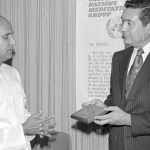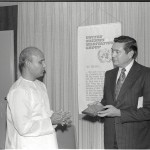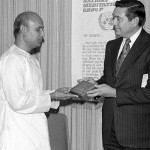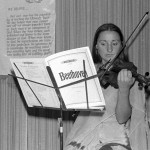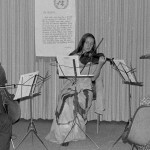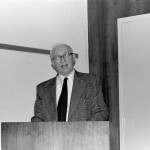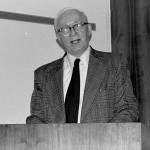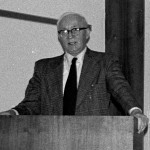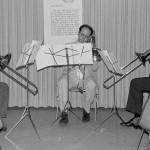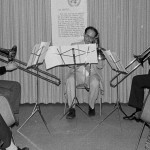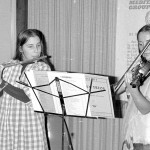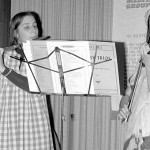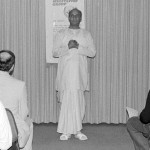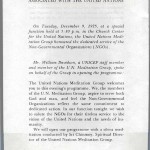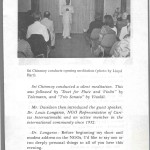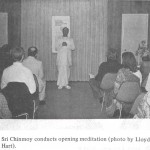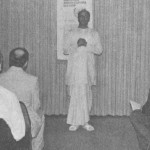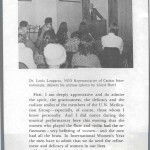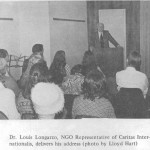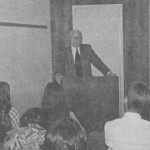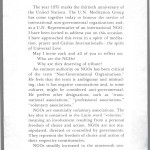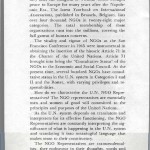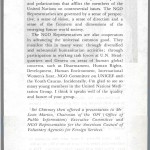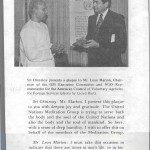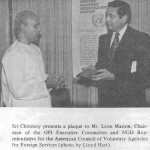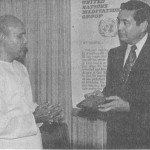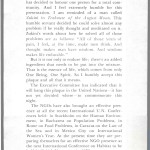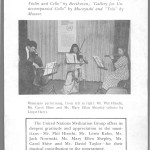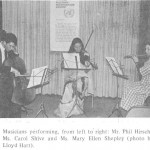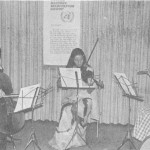Tribute to Non-Governmental Organisations (NGOs) Associated with U.N. – 1975 Dec 09
Filed under Music and Songs | Thoughts from the UN community. | Tributes and Expressions of appreciationOn Tuesday, December 9, 1975, at a special function held at 5 : 30 p m. in the Church Center for the United Nations, the Meditation Group at the UN honoured the dedicated service of the Non-Governmental Organizations ( NGOs) .
A Tribute to the Non-Governmental
Organisations Associated with the United Nations
9 December 1975
Mr. William Sunil Davidson, a UNICEF staff member and member of the Meditation Group, spoke on behalf of the Group in opening the programme:
The Meditation Group at the United Nations welcomes you to this evening’s programme . We, the members of the Meditation Group, aspire to serve both God and man, and feel the Non-Governmental Organizations reflect the same commitment to dedicated act ion. In our function tonight we wish to salute the NGOs for their tireless service to the vision of the United Nations and the needs of humanity. We will open our programme with a silent meditation conducted by Sri Chinmoy, leader of the Meditation Group.
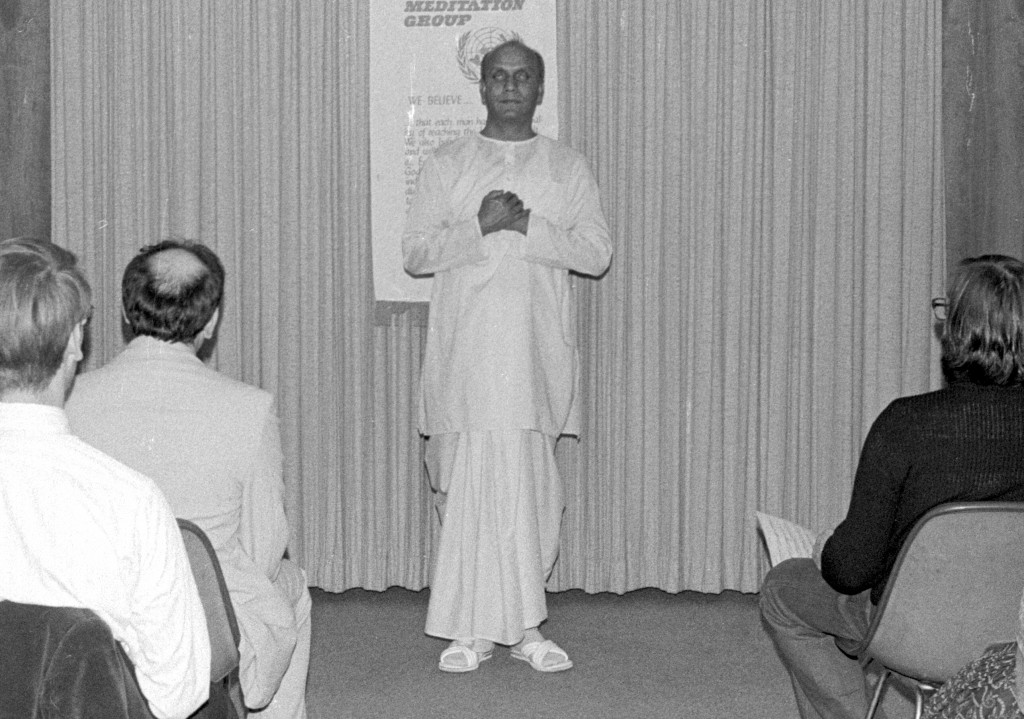 Sri Chinmoy conducts opening meditation (photo by Lloyd Hart).
Sri Chinmoy conducts opening meditation (photo by Lloyd Hart).
Sri Chinmoy conducted a silent meditation. This was followed by “Duet for Flute and Violin” by Telemann, and “Trio Sonata” by Vivaldi.
Mr. Davidson (above) then introduced the guest speaker, Dr. Louis Longarzo, NGO Representative of Caritas Internationalis and an active member in the international community since 1952.
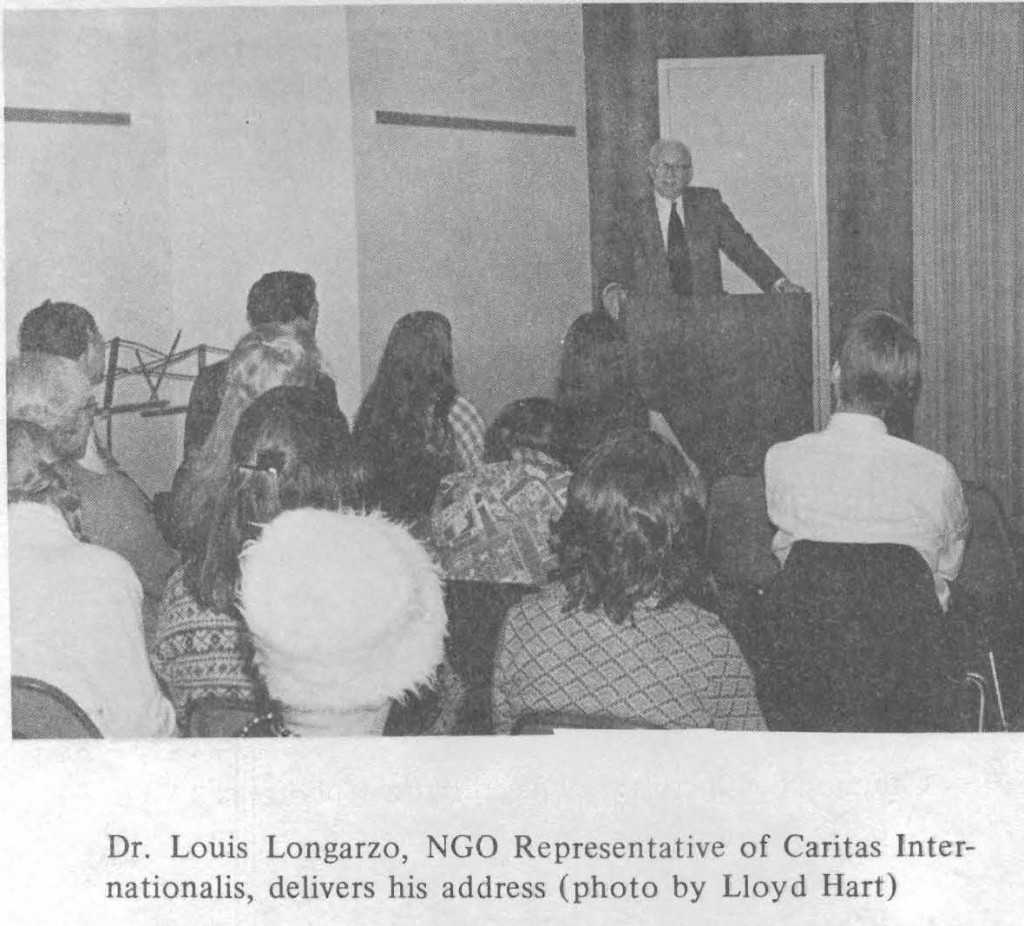 Dr. Longarzo: Before beginning my short and modest address on the NGOs, I’d like to say one or two deeply personal things to all of you here this evening.
Dr. Longarzo: Before beginning my short and modest address on the NGOs, I’d like to say one or two deeply personal things to all of you here this evening.
Dr. Louis Longarzo, NGO Representative of Caritas lnternationalis, delivers his address (photo by LIoyd Hart)
First, I am deeply appreciative and do admire the spirit, the graciousness, the delicacy and the radiant smiles of the members of the Meditation Group-especially, of course, those whom I know personally. And I did notice during the musical performances here this evening that the women who played the flute and violin had the refinement – very befitting of women – and the men had all the brass.
In International Women’s Year the men have to admit that we do need the refinement and delicacy of women in our lives.
My talk tonight is entitled:
TRIBUTE TO THE NON-GOVERNMENTAL ORGANIZATIONS -A THIRTY-YEAR PERSPECTIVE
The year 1975 marks the thirtieth anniversary of the United Nations. The U.N. Meditation Group has come together today to honour the service of international non-governmental organizations and , as a U.N. Representative of an international NGO, I have been invited to address you on this occasion.
I have approached this event in a spirit of meditation, prayer and Caritas Internationalis – the spirit of Universal Love.
May I invite each and all of you to reflect on:
- Who are the NGOs?
- Why are they deserving of tribute?
An eminent authority on NGOs has been critical of the term “Non-Governmental Organizations.” He feels that the term is ambiguous and misleading, that it has negative connotations and, in some cultures, might be considered anti-governmental. He prefers other designations, such as “transnational associations,” “professional associations, ” “voluntary associations.”
NGOs are essentially voluntary associations. The key idea is contained in the Latin word “voluntas,” meaning an involvement resulting from a personal freedom of choice and action. NGOs are not manipulated, directed or controlled by governments. They represent the freedom of choice and action of their respective constituencies. NGOs steadily increased in the nineteenth century after the Congress of Vienna, which brought peace to Europe for many years after the Napoleonic Era. The latest Yearbook on International Associations, published in Brussels, Belgium, lists over four thousand NGOs in twenty-eight major categories. The total membership of these organizations runs into the millions, covering the full gamut of human concerns.
The vitality and vigour of NGOs at the San Francisco Conference in 1945 were instrumental in obtaining the insertion of the historie Article 71 in the Charter of the United Nations. Article 71 brought into being the “Consultative Status” of the NGOs to the Economic and Social Council. At the present time, several hundred NGOs have consult ative status in the U. N. system in Categories 1 and 11 and the Roster , with varying privileges and responsibilities.
How do we characterise the U.N. NGO Representatives? The NGO rep representatives are essentially men and women of good will committed to the principles and purposes of the United Nations.
As the U. N. system depends on translators and interpreters for its effective functioning , the NGO Representatives are constantly interpreting the significance of what is happening in the U.N. system and translating it in to meaningful language that makes sense to their constituency.
The NGO Representatives are transcendentalists ; they endeavour in their thoughts, words and deeds to transcend the passions, polemics, politics and polarizations that afflict the members of the United Nations on controversial issues. The NGO Representatives are governed by a sense of perspective, a sense of vision, a sense of direction and a sense of the frontiers and dimensions of the emerging future world society.
The NGO Representatives are also cooperators in advancing the universal common good. They manifest this in many ways: through diversified and substantial humanitarian activities ; through participation in working task forces at U.N. Headquarters and Geneva on areas of human global concerns, such as Disarmament, Human Rights, Development, Human Environment, International Women’s Year, NGO Committee on UNICEF and the Youth Caucus.
Incidentally, am glad to see so many young members’ in the Meditation Group at the U.N. I think it speaks well of the quality and future of your group. ‘
Sri Chinmoy then offered a presentation to Mr. Leon Marion, Chairman of the OPI (Office of Public Information) Executive Committee and NGO Representative for the American Council of Voluntary Agencies for Foreign Servicés.
Sri Chinmoy presents a plaque to Mr. Leon Marion, Chairman of the OPI Executive Committee and NGO Representative for the American Council of Voluntary Agencies for Foreign Services (photo by Lloyd Hart).
Sri Chinmoy:
Mr. Marion, I present this plaque to you with deepest joy and gratitude. The Meditation Group at the UN is trying to serve both the body and the soul of the United Nations and also the body and the soul of mankind. So here, with a sense of deep humility, I wish to offer this on behalf of the members of the Meditation Group.
Mr. Leon Marion:
I must take this occasion to indicate that there are times in one’s life, or in history, when time and space come together. This is one of those times in history , in which a movement has decided to honour one person for a total community. And I feel extremely humble for this presentation. I am reminded of a man called Zukini in Teahouse of the August Moon. This humble servant decided he could solve almost any problem if he really thought and meditated on it. Zukini’s words about how he solved all of those problems are as follows: “All of those years 0f’ pain, l feel , all the time, make men think. And thought makes man have wisdom. And wisdom makes life endurable.”
But it is not only to endure life; there’s an added ingredient that needs to be put into the mixture. That is the essence of life , which comes from only One Being, One Spirit. So I humbly accept this plaque and all that it means.
The Executive Committee has indicated that it will hang this plaque in the United Nations – it has not yet decided where – to commemorate this night.
The NGOs have also brought an effective presence at all the recent International U. N. Conferences held: in Stockholm an the Human Environment, in Bucharest on Population Problems, in Rome on Food Problems, in Caracas on the Law of the Sea and in Mexico City on International Women’s Year. At the present time they are preparing themselves for an effective NGO presence at the next International Conference on Habitat to be held in British Vancouver in 1976.
It can be seen, therefore, that in essence a tribute to the NGOs is :
- a tribute to the dignity and worth of each person;
- a tribute to freedom of association, thought and action ;
- a tribute to the realistic possibility of a world community bound together by knowledge, understanding and ties of mutual love and service.
It is true that the realities always fa l! short of the ideals. To transform these ideals into everyday realities, powerful spirital weapons are needed :
- the power of faith, hope and love;
- the power of meditation and prayer:
- the power of moral, intellectual and spiritual discipline.
It seems to me that the challenge of the next thirty years for the NGOs is to utilise all these powerful spiritual weapons to transform gradually a community of independent , sovereign states into a genuine World Community a world community which will fully realise and implement Article I of the Universal Declaration of Human Rights:
“All human beings are born free and equal in dignity and rights. They are endowed with reason and conscience and should act towards one another in a spirit of brotherhood. “
May we all become worthy instruments for a World Community.
A short musical interlude followed: “Duet for Violin and Cello” by Beethoven ; “Gallery for Unaccompanied Cello ” by Muczynski and “Trio” by Mozart.
The Meditation Group offers its deepest gratitude and appreciation to the musicians – Mr. Phil Hirschi, Mr. Lewis Kahn, Mr. Jack Nowinski, Ms. Mary Ellen Shepley, Ms. Carol Shive and Mr. David Taylor – for their musical contribution to the programme.
Click to see page images and photos in larger size or different resolution.
Gallery 1
- 1975-12-09dec-tribute to-ngos-associated-with-un-sri-chinmoy-Leon-Marion-speaks
- 1975-12-09dec-tribute to-ngos-associated-with-un-sri-chinmoy-Leon-Marion-speaks-crp-1
- 1975-12-09dec-tribute to-ngos-associated-with-un-sri-chinmoy-Leon-Marion-speaks-crp-2
- 1975-12-09dec-tribute to-ngos-associated-with-un-Dr-Louis-Longarzo-NGO-Rep-Caritas-lnternationalis
- 1975-12-09dec-tribute to-ngos-associated-with-un-sri-chinmoy-presents-to-Leon-Marion
- 75-109-01-crp-09-dec-1976-appreciation-ngo-associations
- 75-109-01-sunil-davidson-09-dec-1976-appreciation-ngo-associations
- 75-109-12-musicians-horns.jp
- 75-109-13-musicians-brass
- 75-109-14-musicians-flute
- 75-109-15-musicians-flute
- 75-109-17-cjg
Gallery 2: Page images from Periodic Bulletin “Meditation at the United Nations” Dec 1975
- 1975-12-dec-09-tribute-ngo-assoc-un-bu-scpmaun-1976-03-27-vol-04-pp-14-23_Page_01
- 1975-12-dec-09-tribute-ngo-assoc-un-bu-scpmaun-1976-03-27-vol-04-pp-14-23_Page_02
- 1975-12-dec-09-tribute-ngo-assoc-un-bu-scpmaun-1976-03-27-vol-04-pp-14-23_Page_02-crp-ckg-
- 1975-12-dec-09-tribute-ngo-assoc-un-bu-scpmaun-1976-03-27-vol-04-pp-14-23_Page_03
- 1975-12-dec-09-tribute-ngo-assoc-un-bu-scpmaun-1976-03-27-vol-04-pp-14-23_Page_07
- 1975-12-dec-09-tribute-ngo-assoc-un-bu-scpmaun-1976-03-27-vol-04-pp-14-23_Page_10
- 1975-12-dec-09-tribute-ngo-assoc-un-bu-scpmaun-1976-03-27-vol-04-pp-14-23_Page_10-musicians
- 1975-12-dec-09-tribute-ngo-assoc-un-bu-scpmaun-1976-03-27-vol-04-pp-14-23_Page_10-musicians-2
